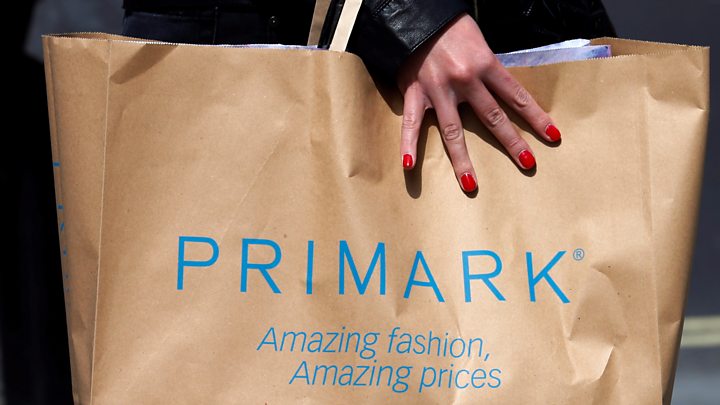
Media playback is unsupported on your device
Primark has defended selling T-shirts for as little as £2, saying its ability to sell clothes so cheaply is down to its business model.
MPs investigating the impact of so-called "fast fashion" asked the firm how it could justify such low prices.
Paul Lister, Primark's head of ethical trade and environmental sustainability, said it spent nothing on advertising and had tight profit margins.
He said he knew of no-one under 16 working in any of its supply factories.
The Commons Environmental Audit Committee is examining the impact of clothes production - for example, looking at the pollution produced by factories - especially items produced cheaply and quickly in response to trends.
It's also examining the conditions experienced by those working in the industry.
Primark has been giving evidence on Tuesday alongside representatives from brands including Marks & Spencer, Burberry and Asos.
Committee chairman and Labour MP Mary Creagh asked Mr Lister: "How can you justify selling T-shirts in your stores for as little as two or three pounds, and how can you be making a profit on those?"
He replied: "Primark has never done any significant advertising at all, and that can save us in any year £100m to £150m compared to some of our larger rivals. That goes straight into price. That keeps our pricing low.
"We often buy on longer lead times in quiet periods for the factories and then we pay the factories early, so if you're a factory owner you'll able to give Primark a better price to reflect that."
He added: "It's our business model that takes us to a £2 T-shirt."
On waste, Mr Lister said Primark had very little unused stock and was planning to launch a take-back scheme for consumers next year, where old clothes can be returned and used again by overseas charities.
What is fast fashion?
The term describes our high rate of fashion consumption fuelled by the quantity of new and cheap clothes.
MPs believe that the throwaway nature of fashion is fuelling fast turnarounds among suppliers, which may result in poor working conditions.
Producing clothes also requires climate-changing emissions. Global textile production produces 1.2bn tonnes of carbon emissions a year - more than international flights and maritime shipping.
Last month, MPs on another committee concluded that the fast fashion industry was a major source of the greenhouse gases that are overheating the planet.
'Industry practice'
High-end fashion brand Burberry defended criticism from MPs for dumping clothes.
Earlier this year the firm was strongly criticised for burning £30m ($40m) of stock. It admitted destroying the unsold clothes, accessories and perfume instead of selling them off cheaply, in order to protect the brand's exclusivity and value.
Leanne Wood, Burberry's chief of corporate affairs, told MPs the firm was "committed" to stopping the activity, but added: "It is an industry practice.
"We're the only luxury business that's reported it in their accounts… but it is something that happens in the industry."
Marks and Spencer's representative, Mike Barry, said that none of the company's waste fabric goes to landfill or for incineration, and that it gives around half a million garments to charity each year.
However, recycling the material was a much harder challenge, he added.
'Offcuts used for sanitary products'
Nick Beighton, CEO of online fashion retailer Asos, said that one of their factories in Kenya had started using fabric offcuts to make toys and sanitary wear.
"[The factory] currently has just under 80 single mothers making garments for that region," he told MPs.
"They've come up with a really neat solution where the offcuts there can be used for toys for children in the area and for sanitary wear for young women in that area."
But he said that this was a local solution that would not work in all Asos factories.
Ms Creagh suggested that by making garments so cheaply, they were devaluing them.
But Mr Lister insisted: "Every item that we make, we're looking at durability… We are proud of the quality and durability of our garments, they're not built to throw away."
Jamie Beck, from the Arcadia group, which includes Topshop, Dorothy Perkins and Burton, said: "These garments aren't designed to be a disposable item, to be bought for [just] a holiday. They're designed to be long-lasting."
Asked why so much clothing was ending up in the bin, Mr Beck replied: "We don't believe it is ending up in the bin. We believe it does go to charity shops, we believe it does get reused."
He said the wealth of garments available for sale on eBay demonstrated that belief.
Carol Kane, joint CEO of Boohoo, was also asked about cheap clothing - and how the company could sell dresses for £5 when the minimum wage was £7.83. She replied that the dressers are intentionally sold at a loss, to drive more traffic to the site.
Asked if consumers were now too accustomed to cheap, disposable clothes, she added: "I believe this all comes back to consumer demand. I've been in the industry for 32 years, and in that time I've seen prices decline."
https://www.bbc.com/news/business-46358969
No comments:
Post a Comment